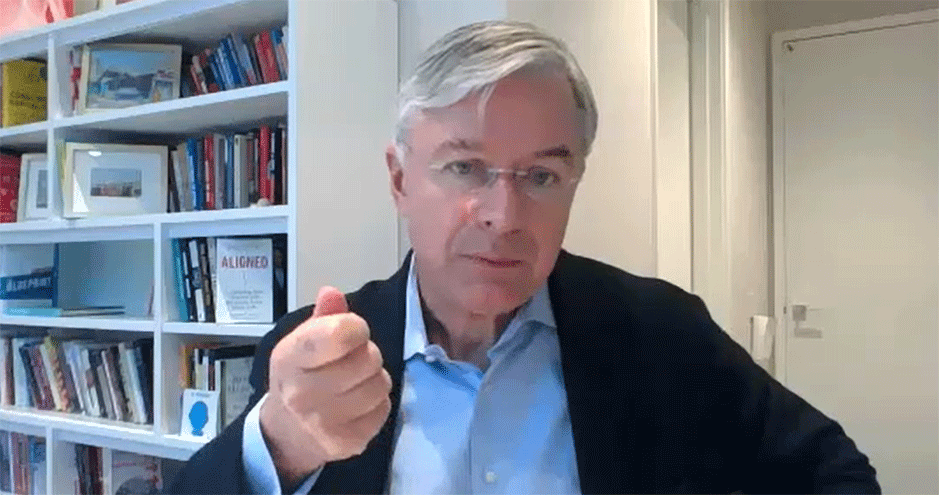Hubert Joly Conference : Reinventing Capitalism
HEC Paris invited Best Buy’s Executive Chairperson Hubert Joly to the first in a series of online seminars, organized by the Society & Organizations Institute (S&O). In a wide-ranging Q&A led by S&O Academic Director, Rodolphe Durand, Joly shared a candid vision of the unprecedented human crisis provoked by the lockdown, its impact on leadership qualities and the challenges that researchers and business leaders need to answer. Listen to the Podcast.

“This is the time for a re-foundation of capitalism and the business that feeds it. There’s no going back, all assumptions need to be reassessed: what have we learnt from the crisis and how can we invent the future?” In a one-hour virtual exchange with HEC professors, students and researchers, Hubert Joly did not mince words as he recounted the last two months at the helm of Best Buy as Chairman, and as board member of Johnson & Johnson and Ralph Lauren. “From a CEO perspective,” he said, “this has been the ‘all-you-can-eat’ menu of a challenge: operational, financial, strategic, government-relational and metaphorical. We’ve also had to reassess risk-management, short and medium-term and, above all, the human challenge posed.”
If ever there is a need to apply the very tenets of the HEC Purposeful Leadership Chair Joly co-founded, it is now, said the 1981 HEC graduate. These center on all the stakeholders and not just the shareholders of a business. “Companies using the excuse of shareholder pressure (to maximize profit) are deeply wrong. Policies have to be multi-stakeholder oriented. The challenge is how to define a universal measure of performance around companies and stakeholders and their purpose. Some rating agencies and the European Union is working on this. We need it here and now.”
All Things Digital
Despite the ravages of the global lockdown, Best Buy has maintained 70% of its activity, an astonishing figure for the leading provider of consumer technology products and services. Much of this has been due to Joly’s ability to mobilize both the workforce and a committed board: “We’ve had to organize weekly board meetings because of the fluidity of the situation and the on-the-ground facts evolving so rapidly. It all accelerated around March 10 and it’s been impossible to plan beyond two weeks at a time. While boards should not take over the running of a company, their judgment and wisdom are very important in these times of crisis. It’s important to have people who have experienced two-three crises and to have the backing of the board. Difficult decisions are being made: whether to close or not our shops, what decisions are to be made on dividends, bonds, executive or board compensation, the amount of cash and debt to take out, impacting on earnings and shares?”
The boards are also debating new risks factors created by the COVID-19 pandemic. “We have to prepare for new facets in the regulatory and compensatory fields brought on by the health crisis. Lawsuits from workers who contracted the virus at work, for example. Some are saying it could be as big as asbestos.” However, there have also been important positives to take from the crisis, insisted Joly: “The virus is going to be with us a long time. So all that’s digital is favored. People are blown away at how productive digital is becoming. Take, for example the Adobe convention held annually in Las Vegas. Normally it attracts 15,000 people. This year, it was ‘visited’ by 80,000 digitally!”
A Call for Post-Crisis Research
Digital has thus become the most effective way to interact. In addition, other major changes are in the offing. A drive towards value; the strengthening of the stronger companies; a deep revision of the supply chain and its dependency on China (“At Best Buy, 60% of what we sold is from China”). And the growth in inequality, which has been sharpened by the demand for all that’s electronics: sales during the crisis shot up in all sectors of home activities – networking, refrigeration, gaming products, computing and machines linked to video conferencing – but not for everyone. “Inequality in society is a daunting issue. I think of the single mother in the Bronx or Seine-Saint-Denis. This has been devastating for her. It’s an issue which must be addressed by companies and management. There’s a lot of work to do in playing our part in making sure the inequality issue gets addressed.”
Hubert Joly warmed to the thought of the academic work to be achieved in order to answer these many challenges. “Researchers are living in a fantastic time. We get to reinvent what the next 20 years are going to look like, shape the leaders of tomorrow. It’s what has made me turn to academia; I want to add my voice to this re-foundation.” But he warned against the notion of a zero-sum game in terms of profits and competition: “We and our competitors can win and grow the market. It’s dangerous to be profit-driven only. I’m here to think about how we create value and enough wealth to spread it to everyone.”